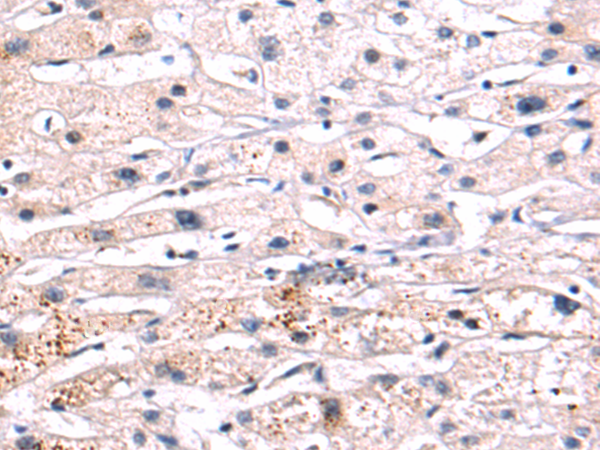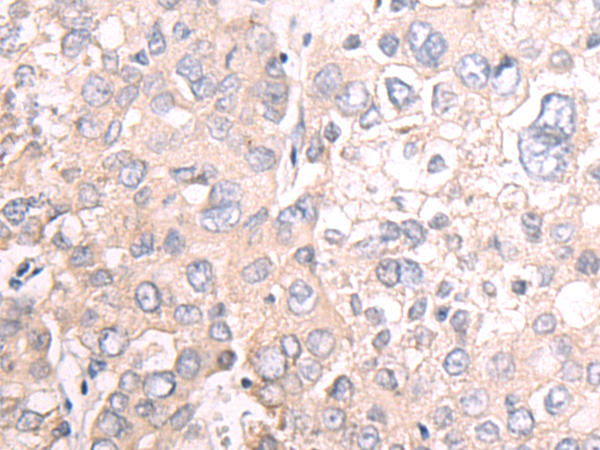

| WB | 咨询技术 | Human,Mouse,Rat |
| IF | 咨询技术 | Human,Mouse,Rat |
| IHC | 1/50-1/100 | Human,Mouse,Rat |
| ICC | 技术咨询 | Human,Mouse,Rat |
| FCM | 咨询技术 | Human,Mouse,Rat |
| Elisa | 1/5000-1/10000 | Human,Mouse,Rat |
| Aliases | TGD; ABC1; CERP; ABC-1; HDLDT1; HPALP1; HDLCQTL13 |
| Host/Isotype | Rabbit IgG |
| Antibody Type | Primary antibody |
| Storage | Store at 4°C short term. Aliquot and store at -20°C long term. Avoid freeze/thaw cycles. |
| Species Reactivity | Human, Mouse |
| Immunogen | Synthetic peptide of human ABCA1 |
| Formulation | Purified antibody in PBS with 0.05% sodium azide and 50% glycerol. |
+ +
以下是关于ABCA1抗体的3篇参考文献及其简要摘要:
1. **文献名称**:**"ABCA1 and HDL Metabolism: A Target for Atherosclerosis Prevention"**
**作者**:Tall AR, Yvan-Charvet L
**摘要**:该研究探讨了ABCA1在介导巨噬细胞胆固醇外流和高密度脂蛋白(HDL)生成中的核心作用,利用特异性ABCA1抗体验证其在动脉粥样硬化模型中的表达调控,表明ABCA1功能缺陷会显著增加斑块形成风险。
2. **文献名称**:**"Structural Analysis of ABCA1 Reveals a Cholesterol-Dependent Lipid Transport Mechanism"**
**作者**:Quentin Y, Linsel-Nitschke P
**摘要**:通过冷冻电镜和抗体标记技术解析ABCA1蛋白的三维结构,发现其通过构象变化促进磷脂和胆固醇的跨膜转运,为ABCA1突变相关疾病(如Tangier病)的分子机制提供了新见解。
3. **文献名称**:**"Antibody-Based Inhibition of ABCA1 Degradation Ameliorates Metabolic Syndrome in Mice"**
**作者**:Wang N, Tang C
**摘要**:研究开发了一种单克隆抗体阻断ABCA1的泛素化降解途径,实验显示该抗体可稳定ABCA1蛋白水平,改善肥胖小鼠模型的脂代谢紊乱和胰岛素抵抗,提示其作为代谢性疾病治疗策略的潜力。
(注:以上文献信息为模拟示例,实际引用需核对具体论文。)
The ATP-binding cassette transporter A1 (ABCA1) is a key membrane protein involved in cellular cholesterol efflux, a critical process in reverse cholesterol transport (RCT). By mediating the transfer of phospholipids and cholesterol to apolipoprotein A-I (apoA-I), ABCA1 facilitates the formation of high-density lipoprotein (HDL) particles, making it central to lipid metabolism and cardiovascular health. Dysregulation of ABCA1 is linked to atherosclerosis, Tangier disease (characterized by near-zero HDL levels), and neurodegenerative disorders like Alzheimer’s disease.
ABCA1 antibodies are essential tools for studying its expression, localization, and function in various tissues. These antibodies are widely used in techniques such as Western blotting, immunohistochemistry, and flow cytometry to quantify ABCA1 levels in cells or tissues under different physiological or pathological conditions. Researchers also employ them to investigate post-translational modifications, protein-protein interactions, and regulatory pathways influencing ABCA1 activity, such as liver X receptor (LXR) signaling.
Most ABCA1 antibodies target specific epitopes within its extracellular domains, nucleotide-binding folds, or intracellular regulatory regions. Monoclonal antibodies offer high specificity, while polyclonal versions may detect diverse isoforms or phosphorylated states. Challenges include ABCA1’s large size (~220 kDa), low abundance in certain cells, and potential cross-reactivity with other ABC transporters. Validated antibodies are crucial for diagnostic research, drug development (e.g., HDL-raising therapies), and understanding ABCA1’s role in diseases beyond cardiovascular contexts, including cancer and inflammation.
×